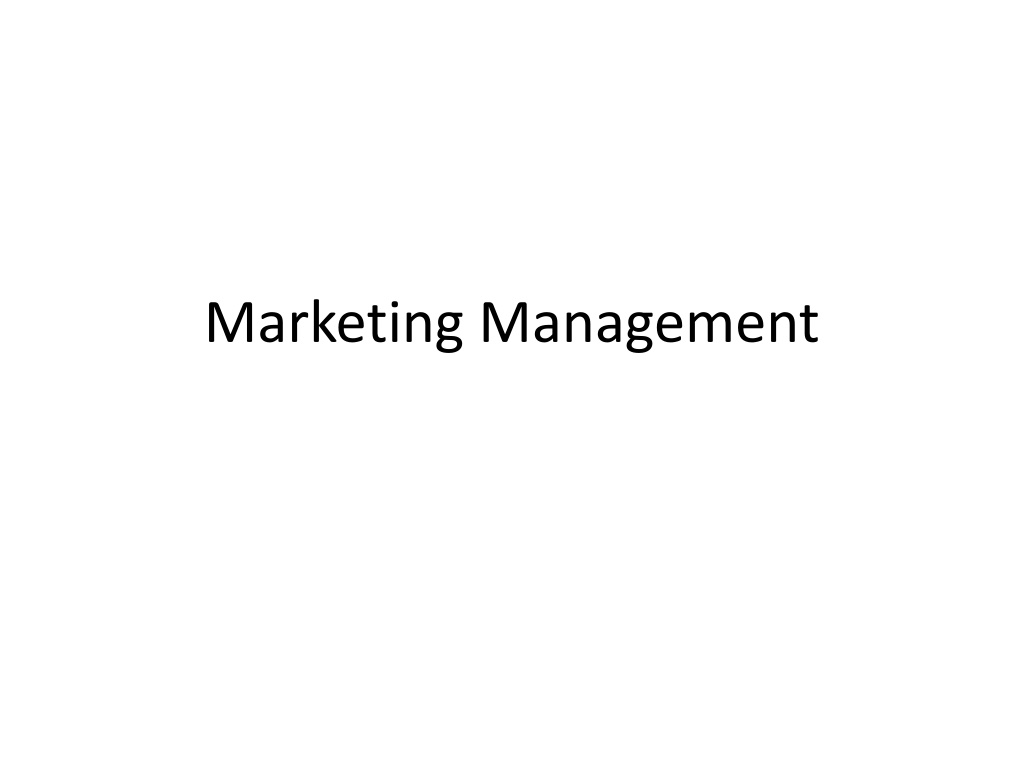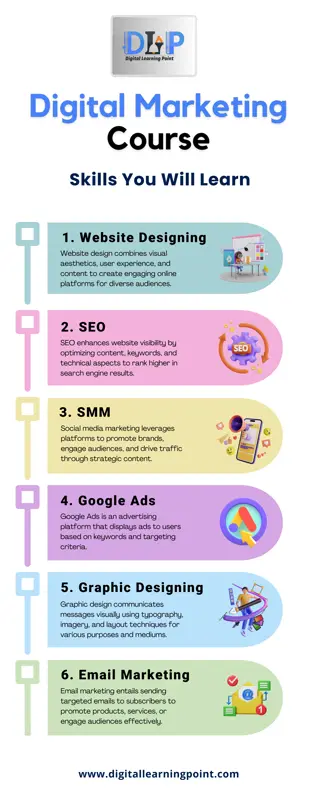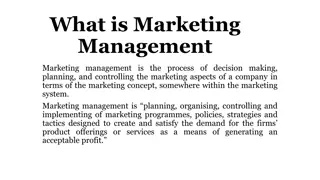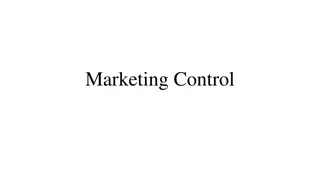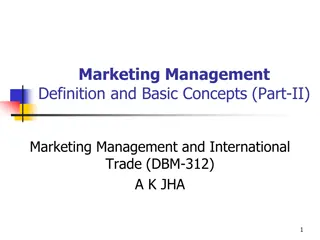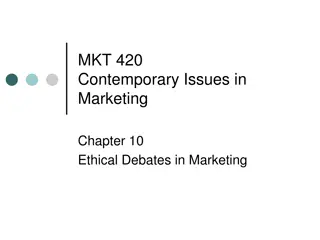Understanding Marketing Management: Core Concepts and Scope
Marketing management involves directing business activities to facilitate the flow of goods and services from producers to consumers. It encompasses concepts such as consumer orientation, analysis of market trends, planning for marketing functions, and evaluating marketing activities to achieve corporate objectives. The core principles of exchange and value creation play a vital role in shaping successful marketing strategies.
Download Presentation

Please find below an Image/Link to download the presentation.
The content on the website is provided AS IS for your information and personal use only. It may not be sold, licensed, or shared on other websites without obtaining consent from the author. Download presentation by click this link. If you encounter any issues during the download, it is possible that the publisher has removed the file from their server.
E N D
Presentation Transcript
Marketing: Marketing is the performance of business activities directed toward, and incident to, the flow of goods and services from producer to consumer or user AMA (1948) Marketing is the performance of business activities that direct the flow of goods and services from producer to consumer or user. AMA (1960) A societal process by which individuals and groups obtain what they need and want through creating, offering, and freely exchanging products and services of value with others. Kotler Marketing is the combination of activities designed to produce profit through ascertaining, creating, stimulating, and satisfying the needs and/or wants of a selected segment of the market. Eldridge
Nature of Marketing: Consumers and Competitors Oriented It has consumers and competitors orientation in its business planning and activities. Corporate Objectives Corporate objectives are given top preferences and departmental goals act as the means to achieve corporate goals. Planning and Implementation of Marketing Objectives It follows the system approach in planning, organizing, controlling and coordinating its entire business as a system to achieve the overall corporate objectives. Analysis and Forecasting Collection, analysis and forecasting of consumers needs, wants, desires, demands, ability to pay, willingness to pay etc. are made for market survey and research. Planning and Development of Products and Services It develops products and provides services to match with the anticipated consumer demand. Stimulation of Consumer Demand It stimulates consumers demand by logical pricing and influencing promotion techniques. Services to Consumers to yield Customers Satisfaction It makes all sorts of attempts and render a variety of series to satisfy consumers.
Scope of Marketing Analysis of the Market It is done through marketing research. Data and information are collected through market surveys. Planning for Marketing Functions On the basis of market analysis, the marketing goals and targets are determined, i.e. quantity to be sold and produced, volume of goods to be made available in the different segments. Designing Marketing Structur The marketing structure is designed considering different activities required for effective marketing of goods and services. Marketing Research Marketing utilizes marketing research to consider the changes in taste, fashion, habit, liking, disliking, and preferences of the customers, and new types of goods and services to be introduced in the market. Pricing of the Product The success of the marketing depends on the right pricing decision at the right moment. Evaluation of Marketing Activities various marketing activities are evaluated, for example, determining the efficiency of sales personnel and the effectiveness of the sales techniques
Core Concepts of Marketing Exchange Concept Marketing involves the exchange of a product and service in lieu of money between a seller and a buyer, but modern marketing is not merely an exchange operation. Marketing has now gained a much wider connotation. It covers the search for customers wants, formulation of marketing strategies, marketing mix, creative selling and advertising, serving the customers and so on. This exchange oriented marketing approach has been enriched by a range of newer activities of marketing. Product Concept This traditional philosophy which was popular in the 1930s made the management firmly believe that if the product has superb features, quality and performance, customer response is bound to be favourable and promotion efforts are not required. Production Concept According to this concept, the marketing department of a company is made to sell whatever is produced. The product line is usually narrow. The price is based on production and distribution costs. Technical research enables product improvement and cost-cutting in the production process. Packaging is expected to protect the product and minimise cost credit is regarded as a necessary evil. The producer is interested only to minimise bad debt losses. Promotion is adopted only to give emphasis on product features, quality and price.
Sales Concept Buyers market for many commodities has brought about sales orientation in marketing. Those holding this viewpoint believe that a company cannot secure enough customer response to its products without high-pressure salesmanship, aggressive advertising and intensive sales promotion. Sales orientation gives emphasis on increasing sales volume even at the cost of consumer satisfaction and service. Marketing Concept When a marketer adopts a market-oriented business philosophy, the guiding principle becomes it is more effective to make what customer wants to buy than to sell them what a marketer wants to make or sell. Thus, primary and co-ordination of all company activities rotate around the primary goal of satisfying customer needs. The marketing concept is defined as a customer-oriented philosophy duly integrated and implemented through the entire organisation in order to serve customers better than competitors and thereby ensure sustained growth and prosperity. Standard of Living Concept This concept of marketing was developed by Paul Mazur who gave a sentimental definition of marketing. According to his viewpoint, Marketing delivers the standard of living to the society. Though this concept of marketing is customer-oriented up to some extent but not a complete one. Utility Concept This concept of marketing is an extension of the classical economic concept. According to this concept, marketing has been defined as the creation of time, place and possession utilities. The definition of R.Buskirk can be put under this head, Market is an integrated system of action that creates value in goods through the creation of place, time and ownership utilities.
Revenue Concept According to this concept, Marketing is that activity that earns profit for the business. A marketing executive is concerned with the charging or remunerative prices which will contribute most to company profits. Thus, profit is the criterion by which the marketing manager should make his decisions. Functions of a Marketing The functions of a marketing are listed below: Target Market Product and Service Promotion Distribution Pricing Importance of Marketing Marketing Promotes Product Awareness to the Customers Marketing Helps Boost Product Sales Marketing Improves Standard of Living Marketing Connects the Producers and Consumers Marketing Provides Employment Opportunities Marketing Helps to Provide Economic Stability
